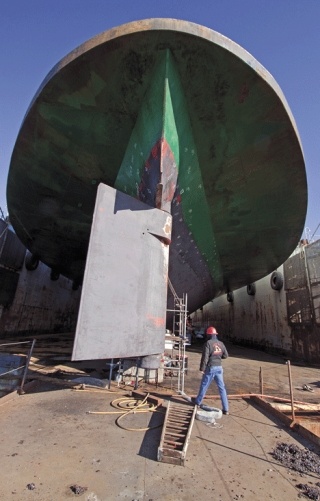LANGLEY — The director of the state ferry system took more than a few shots across the bow Saturday.
When David Moseley told an overflow audience at Langley Middle School he was there to solicit ideas on the state’s plan for a reservation system for ferry riders, he was met with a chorus of catcalls.
The message was clear.
“We don’t want any reservations at all,” someone shouted from the crowd.
State transportation planners unveiled Washington’s long-range plan for the ferry system in December, and the plan has found avid critics in ferry communities throughout Western Washington.
On the South End, many ferry riders are worried about the state’s proposal to require
during peak travel periods. Elsewhere, others have raised concern about the plan to keep one vessel on the Keystone-Port Townsend route and other service cuts throughout the ferry system.
At Saturday’s meeting — hosted by State Rep. Norma Smith (R-Clinton) and Langley Mayor Paul Samuelson — Moseley said the Edmonds-Kingston run will most likely be first in line to get the reservation system, but added that wouldn’t happen for another two years at least.
Though ferry officials have said it’s up to state lawmakers to finalize the state’s plan for ferries, some residents feel the plan is almost a done deal and state officials are asking for input that will have no effect on the future of the ferry system.
Even so, many were still eager to speak out. Roughly 30 people in the crowd of more than 230 jumped to their feet when the meeting moved to the public comment period.
Monica Guzman of Langley gave Moseley a petition signed by more than
500 islanders who oppose the reservations plan. Guzman and Carol Ryan had set up signing tables at two locations in Langley over the past month.
“There are too many unanswered questions,” Guzman said.
“What happens if the ferry fills up before those with reservations arrive? Will it go half empty? Where will cars in Mukilteo go if they aren’t in the ferry’s reservation system?” Guzman asked.
Ferry officials have said reservation systems work in other parts of the world. And
Moseley said that a study of current routes that utilize reservations — including the Keystone-Port Townsend and Sydney, British Columbia runs — has shown them to be effective.
“Properly implemented, reservations can be beneficial to customers by providing certainty and less time waiting for a ferry,” Moseley said. “It reduces the impact of cars and makes better use of our terminals.”
Paulette Becker said she finds the whole concept elitist.
“I know people who can’t afford increases in ferry fares, who don’t have cell phones to make or change reservations,” she said. “That isn’t the way people here live their lives.”
She told Moseley that she traveled to Port Townsend for an informal look at how merchants there viewed reservations.
“Every single one was opposed, saying that the plan had been forced on them and they didn’t like it,” she said. “Frankly, I haven’t talked to a single person who wants reservations.”
Others agreed.
“No matter the route, there will be those without reservations who need to get across,” said Dick Robins. He said the plan for reservations was “simply unrealistic.”
Donna Roddy said it was a hassle getting to Port Townsend using the current reservation process.
“I was put on hold repeatedly,” she said. “I’d like the same respect for my freedom to travel as the salmon get. The state spends millions for salmon recovery and I’m just as important.”
Moseley said the state ferry system faces serious challenges, however, including a $3.3 billion deficit over the next 22 years. Changes are needed because the ferry system has an aging fleet, increased overall ridership and worn-out terminals.
“First of all, the changes are not going to happen tomorrow,” he said.
“After the Legislature approves it and a pre-design, route-specific study has been done, the reservation system will be applied route-by-route,” he said.
Rider reservations would help Washington State Ferries, Moseley said, a system that was “not financially sustainable and hasn’t been for a number of years.”
“There is a gap between dedicated revenue and expenditures and it’s our belief that the reservation system would dramatically lessen the need for new ferries and terminal replacement or expansion,” he said.
Moseley also said the discussion would continue.
“This is just the beginning of the discussion with users, communities and the Legislature,” he said.
Jeff VanDerford can be reached at 221-5300 or jvanderford@southwhidbey
record.com.



